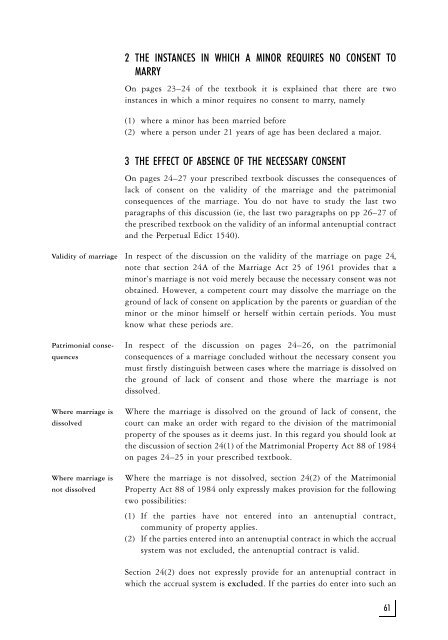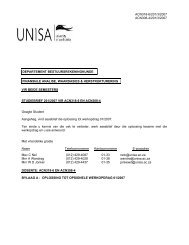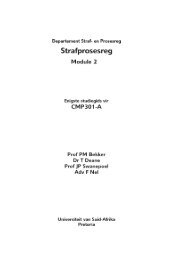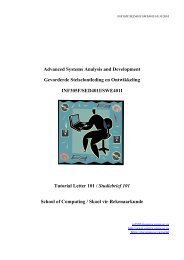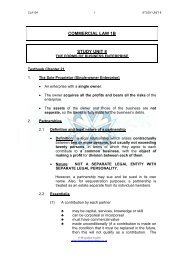key to the study guide - Name
key to the study guide - Name
key to the study guide - Name
Create successful ePaper yourself
Turn your PDF publications into a flip-book with our unique Google optimized e-Paper software.
2 THE INSTANCES IN WHICH A MINOR REQUIRES NO CONSENT TO<br />
MARRY<br />
On pages 23±24 of <strong>the</strong> textbook it is explained that <strong>the</strong>re are two<br />
instances in which a minor requires no consent <strong>to</strong> marry, namely<br />
(1) where a minor has been married before<br />
(2) where a person under 21 years of age has been declared a major.<br />
3 THE EFFECT OF ABSENCE OF THE NECESSARY CONSENT<br />
On pages 24±27 your prescribed textbook discusses <strong>the</strong> consequences of<br />
lack of consent on <strong>the</strong> validity of <strong>the</strong> marriage and <strong>the</strong> patrimonial<br />
consequences of <strong>the</strong> marriage. You do not have <strong>to</strong> <strong>study</strong> <strong>the</strong> last two<br />
paragraphs of this discussion (ie, <strong>the</strong> last two paragraphs on pp 26±27 of<br />
<strong>the</strong> prescribed textbook on <strong>the</strong> validity of an informal antenuptial contract<br />
and <strong>the</strong> Perpetual Edict 1540).<br />
Validity of marriage In respect of <strong>the</strong> discussion on <strong>the</strong> validity of <strong>the</strong> marriage on page 24,<br />
note that section 24A of <strong>the</strong> Marriage Act 25 of 1961 provides that a<br />
minor's marriage is not void merely because <strong>the</strong> necessary consent was not<br />
obtained. However, a competent court may dissolve <strong>the</strong> marriage on <strong>the</strong><br />
ground of lack of consent on application by <strong>the</strong> parents or guardian of <strong>the</strong><br />
minor or <strong>the</strong> minor himself or herself within certain periods. You must<br />
know what <strong>the</strong>se periods are.<br />
Patrimonial consequences<br />
Where marriage is<br />
dissolved<br />
Where marriage is<br />
not dissolved<br />
In respect of <strong>the</strong> discussion on pages 24±26, on <strong>the</strong> patrimonial<br />
consequences of a marriage concluded without <strong>the</strong> necessary consent you<br />
must firstly distinguish between cases where <strong>the</strong> marriage is dissolved on<br />
<strong>the</strong> ground of lack of consent and those where <strong>the</strong> marriage is not<br />
dissolved.<br />
Where <strong>the</strong> marriage is dissolved on <strong>the</strong> ground of lack of consent, <strong>the</strong><br />
court can make an order with regard <strong>to</strong> <strong>the</strong> division of <strong>the</strong> matrimonial<br />
property of <strong>the</strong> spouses as it deems just. In this regard you should look at<br />
<strong>the</strong> discussion of section 24(1) of <strong>the</strong> Matrimonial Property Act 88 of 1984<br />
on pages 24±25 in your prescribed textbook.<br />
Where <strong>the</strong> marriage is not dissolved, section 24(2) of <strong>the</strong> Matrimonial<br />
Property Act 88 of 1984 only expressly makes provision for <strong>the</strong> following<br />
two possibilities:<br />
(1) If <strong>the</strong> parties have not entered in<strong>to</strong> an antenuptial contract,<br />
community of property applies.<br />
(2) If <strong>the</strong> parties entered in<strong>to</strong> an antenuptial contract in which <strong>the</strong> accrual<br />
system was not excluded, <strong>the</strong> antenuptial contract is valid.<br />
Section 24(2) does not expressly provide for an antenuptial contract in<br />
which <strong>the</strong> accrual system is excluded. If <strong>the</strong> parties do enter in<strong>to</strong> such an<br />
61


